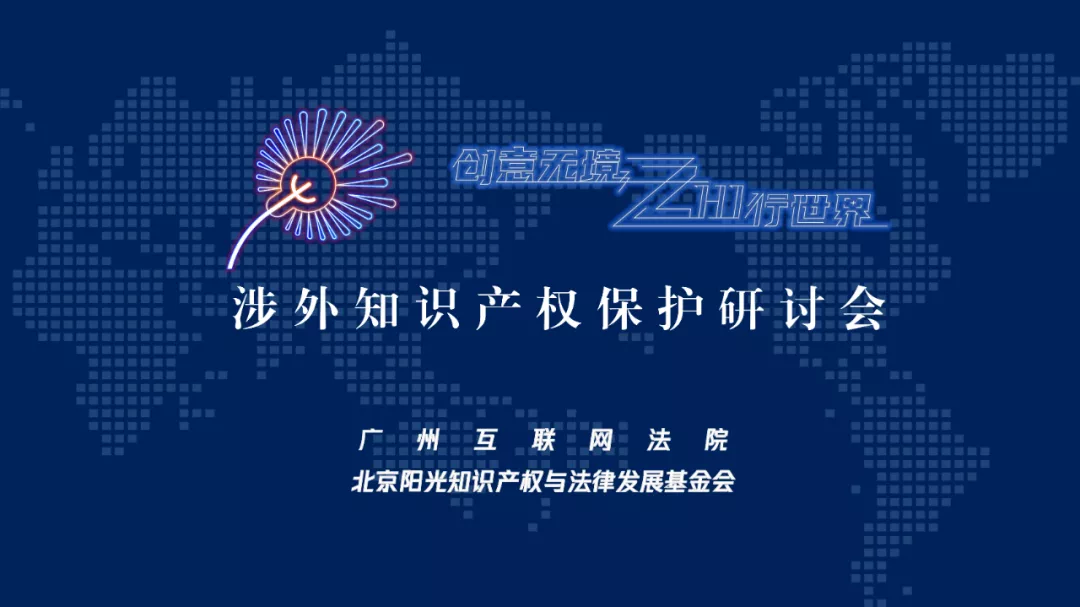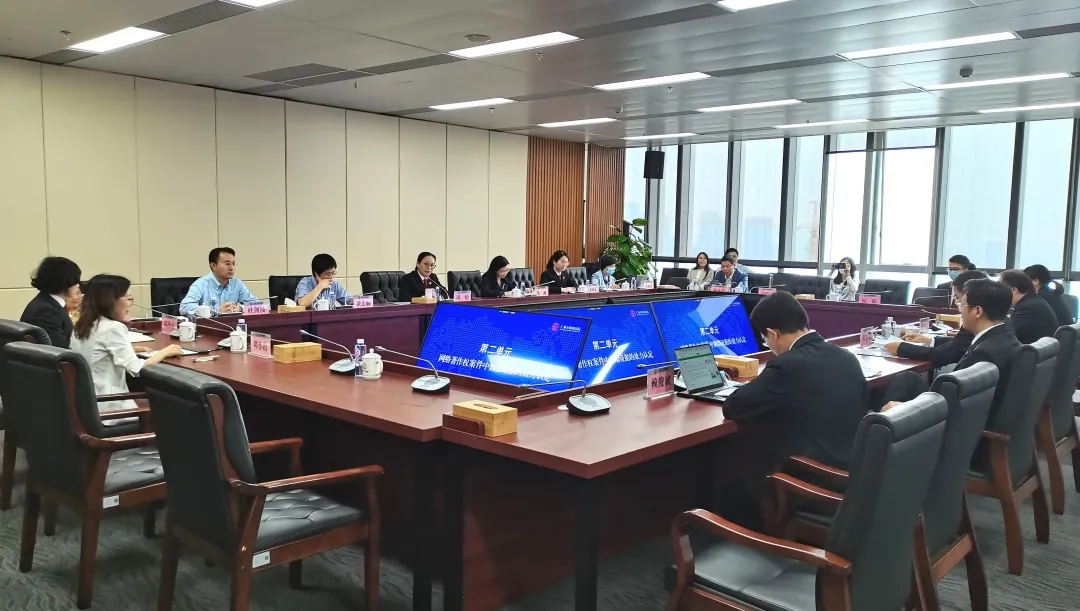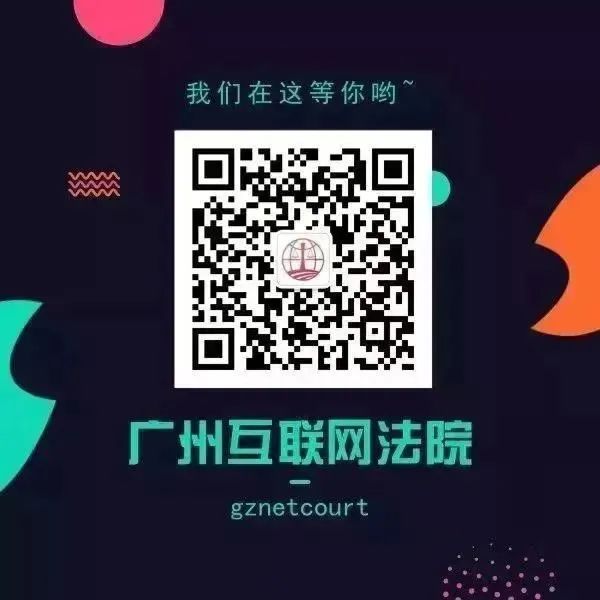On World Intellectual Property Day, to explore the issues of foreign-related intellectual property protection and study the challenges of intellectual property protection together in the new era, the foreign-related intellectual property protection seminar—"Innovation & IP"—sponsored by The Guangzhou Internet Court and the Beijing Sunshine Intellectual Property and Law Development Foundation, was successfully held on April 20.
The conference invited more than 20 experts and scholars with profound academic guidance and extensive social influence in the field of intellectual property including university professors, senior lawyers, representatives of Internet companies, and other colleagues in cycles of the theoretical and the practical to participate in the discussion.



Presentations
Jianbo Du, the senior manager of Baidu's legal department, believes that domain names are currently very important intangible assets. In the cloud era, the duty of care of domain name service providers has been newly defined in judicial practice, and there is a tendency to transform from "Notice-Delete" to "Transfer Notice", but for obvious infringement facts, the duty of care of domain name service providers should still adapt to the "Red Flag" principle.
Jie Zhou, the general manager of game legal affairs of NetEase, introduced the internationalization of online games and the comparison of the judicial protection environment of online games at home and overseas and proposed that the domestic jurisdictional basis usually could be found for common disputes about foreign-related online game intellectual property.
Yingxia Su, the judge of the Second Comprehensive Trial Division of the Guangzhou Internet Court, took the case of domain name infringement dispute between Chen and BULU Company as an example to analyze the rules for determining the territorial jurisdiction of foreign-related domain name disputes. He proposes to further improve China's jurisdiction system for foreign-related civil and commercial cases and build an open economic system at a higher level.

Huijia Xie, a professor at the Law School of the South China University of Technology, said that with the global flow of innovative resources, there is also competition in systems on which the international choice of jurisdiction depends. On the one hand, we must protect our domestic rights of holders by the law, and on the other hand, we must enhance the international credibility of our judicial system through applying fair justice. In foreign-related Internet disputes, the application of our laws, which can withstand the test, must be based on the reference in the international community.
Professor Liang Zhang, the Dean of the Law School of Sun Yat-sen University, said that the reasonable expansion of the interpretation of "the principle of practical connection" in specific cases is in line with the development of judicial protection of the Internet. For foreign-related dispute cases with domestic connection points, an attitude of positive jurisdiction should be upheld.
Review
Yanrong Li, the senior counsel of Beijing Taoan Law Firm, commented that for foreign-related Internet dispute cases, the principle of minimum jurisdiction connection point and collective principle can first be used to determine their rules. Secondly, for parallel litigation issues, Chinese courts can exercise jurisdiction without conflict with international treaties and international conventions. Finally, for the application of the law, the confirmation of applying Chinese law can refer to the domain name infringement dispute between Chen and BULU Company.
Haitang Xiao, the vice president of the Third Civil Trial Division of the Guangdong Provincial Higher People's Court, commented that for the jurisdiction of foreign-related Internet dispute cases, it is necessary to establish the concept of active jurisdiction, and fully consider factors such as actual jurisdiction and appropriate correlation. At the same time, we will further enhance our influence in the field of Internet governance by trying cases with international influence and strengthening case publicity.
Professor Xuan Xu, the Dean of the Institute of Intellectual Property Rights of Jinan University, commented that the Internet is a global platform, and in considering the jurisdiction of foreign-related Internet dispute cases, it is necessary to consider it with global thinking and perspective. At the same time, we should take a rational and prudent attitude towards foreign-related jurisdiction disputes, focus on the location of the interests of the case, and protect the legitimate rights and interests of the Internet as a whole.


Presentations
Lei Wang, the secretary-general of the Internet Law Research Institute of Sina Group, introduced relevant judicial precedents and believed that the attitude towards extraterritorial evidence should not be "One-Size-Fits-All", but be tested based on whether the purpose of evidence collection is legitimate or whether other means are exhausted. At the level of the evidence's effectiveness or probative power, it is necessary to test whether there are sufficient notarization procedures and whether it can be corroborated with other evidence to form a chain.
Jing Qiao, the expert and legal counsel of Tencent, said that the current extraterritorial evidence certification requires an extremely cumbersome notarization and certification process. Another way is directly collecting evidence outside the territory; however, it is difficult for ordinary individual parties to bear the cost. So, the extraterritorial evidence should not be mechanically excluded because it is from the other side of the firewall, and it does not have the perfect procedural requirements. To determine the level of its probative power, it is necessary to recognize the authenticity and probative power of the extraterritorial evidence by other factual supporting evidence that forms a complete chain. In addition, the effectiveness standard of the extraterritorial evidence should not be limited to online copyright cases, but also be applied in other intellectual property cases even general civil cases.

Jinru Dai, the judge of the Second Comprehensive Trial Division of the Guangzhou Internet Court, believes that in civil cases, the parties used the VPN method to conduct international networking based on the need to prove the facts of the case, and searched, screenshotted, downloaded, or recorded screens on the relevant websites involved in the case, which violated relevant administrative regulations, and there were flaws in the means of evidence collection. However, from the perspective of safeguarding judicial fairness and the balance of the interests of all parties, it was not appropriate to directly exclude evidence just because it was obtained through the other side of the firewall. Although the evidence does not have the full probative force and cannot be used alone as a basis for determining facts, if it can form a complete chain of evidence with other sources, which is sufficient to prove the facts of the case, the people's court may accept it.
Zhongshun Huang, a professor at the Law School of the South China University of Technology, believes that prohibitive provisions of the law are divided into two categories—validity and manageability. The acts of the parties submitting the extraterritorial evidence only involve administrative violations, but they do not harm the interests of others or violate public order. Violations of prohibitive norms in management do not necessarily constitute a substantial impact on the effectiveness of civil juristic acts, so the legality of the extraterritorial evidence should not be directly excluded.
Professor Gefei Ji, the director of the Institute of Civil Procedure Law of China University of Political Science and Law, summarized three adjudication ideas for the court in the face of the legality obstacles of the extraterritorial evidence given the exclusion rules of illegal evidence in article 106 of the judicial interpretation of the Civil Procedure Law: first, while acknowledging the legitimacy of the extraterritorial evidence, it also determines the illegality of the evidence collection; second, the use of the principle of "legal interest protection" to extend the interpretation of the clause, extraterritorial evidence collection does not have a direct impact on the health Internet order, so it can win credibility; third, it is judged by adopting the theory of “balance of interests”. He also pointed out that the distinction between illegal evidence and illegal evidence collection is needed to be discussed broadly for civil adjudication in various countries.
Review
Xuejun Zhang, a senior counsel at Beijing King & Wood Mallesons, commented that paying attention to the positive interests of evidence collection and thereby raising the threshold of prohibition is an inherent view and a consensus of judicial interpretation, which is also consistent with the trend of laws and regulations. In judicial practice, evidence’s legality and probative power are two independent issues.
Lin Xu, the president of the Foreign-related Commercial Trial Division of the Guangzhou Intermediate People's Court, commented that the dispute over the legality of the extraterritorial evidence stems from the conflict between procedural value and substantive justice in civil litigation, and out of the need to find out the truth, the extraterritorial evidence cannot be mechanically excluded only because of procedural flaws. It is necessary to prevent the formality from obstructing the legitimate rights and interests of the parties and the justice of the adjudication.
Jianguo Xiao, a professor in the Law School of Renmin University, commented that too strict procedural restrictions will lead to an increase in the burden of proof and a restriction of the means of evidence collection, resulting in distortion of the civil litigation structure. The legitimacy of the disputed means should be tested through the legitimacy of the purpose and the fungibility, and if there is no intention to endanger public safety and order, and there is a lack of a more legal alternative evidence collection method, it should not be mechanically excluded.


Presentations
Xiaoxia Deng, the legal director of Vipshop (China) Co., Ltd., introduced the common dilemmas of cross-border e-commerce enterprises: first, the use of materials on the product detail page is likely to cause copyright disputes, and even if the supplier makes a non-infringement commitment, the legal risks of the enterprise cannot be completely excluded; second, the brand's control of sales channels can easily make the enterprise face trademark infringement or unfair competition allegations in terms of brand name use and product source. These dilemmas require more discussion and guidance from the theoretical and practical circles on the reasonable duty of care of enterprises, the protection of intellectual property rights, and the balance of market competition.
Wei Zhan, the legal director of Alibaba Group, introduced the similarities between domestic brand trademarks and registered or unregistered trademarks of overseas brands, as well as common IP dispute scenarios in cross-border e-commerce such as bad faith registration and bad faith complaints. Whether it is an overseas brand complaint or a domestic brand advocating rights protection, cross-border e-commerce is facing difficulties in judging, intervening, and solving. He suggested that in judicial practice, it is not appropriate to directly deny the source of genuine products only because of the lack of authorization certificates; in addition, it is necessary to give full play to the role of e-commerce platform governance.
Danyun Deng, the president of the Second Comprehensive Trial Division of the Guangzhou Internet Court, introduced the three types of copyright and unfair competition cases accepted by the Guangzhou Internet Court and put forward that there are many copyright and unfair competition issues in cross-border e-commerce disputes that need to be explored and considered.
Xiaoyao Xie, a professor of the Law School of Sun Yat-sen University, shared the way to apply evaluative norms using confusing judgments as an example.
Xiuqin Lin, the dean of the Institute of Intellectual Property Rights of Xiamen University, proposed that the unbounded nature of cross-border e-commerce and the regional nature of intellectual property rights form a conflict, and some cross-border e-commerce business models will naturally bring about intellectual property infringement, and introduced the performance and reconciliation of conflicts through actual cases. In addition, because trademark disputes often occur online, it is suggested that such cases can be subjected to the jurisdiction of the Internet Court.
Review
Yongqing Qiu, the vice president of the Intellectual Property Law Research Association of Guangdong Province Law Society, commented that the location of intellectual property rights has caused certain conflicts in the field of cross-border e-commerce with the development of the Internet and globalization because foreign entities enjoy the prior rights by extending their copyright to China through the convention, which protects their trademarks. On the other hand, it also makes the regionality of intellectual property vague.
Xin Qu, a third-level senior judge of the Copyright Trial Division of the Guangzhou Intellectual Property Court, believes that the influence of trademarks should be carefully determined under the Internet environment.
Yongzhong Zhang, the dean of the Law School of South China Normal University, commented that in cross-border e-commerce intellectual property disputes, regardless of whether the case has foreign-related factors, the legal rules should be consistent. In cross-border e-commerce disputes, it is necessary to uphold the concept of multi-law application and to distinguish between applicable rules.

Source: Guangzhou Internet Court
Correspondents: Zehui Li, Xiaohong Li
https://mp.weixin.qq.com/s/wAW8a4NvHu_QeWyid4nR4A


微信公众号:北京阳光知识产权基金会
Copyright: The Beijing Sunshine Intellectual Property and Legal Development Foundation